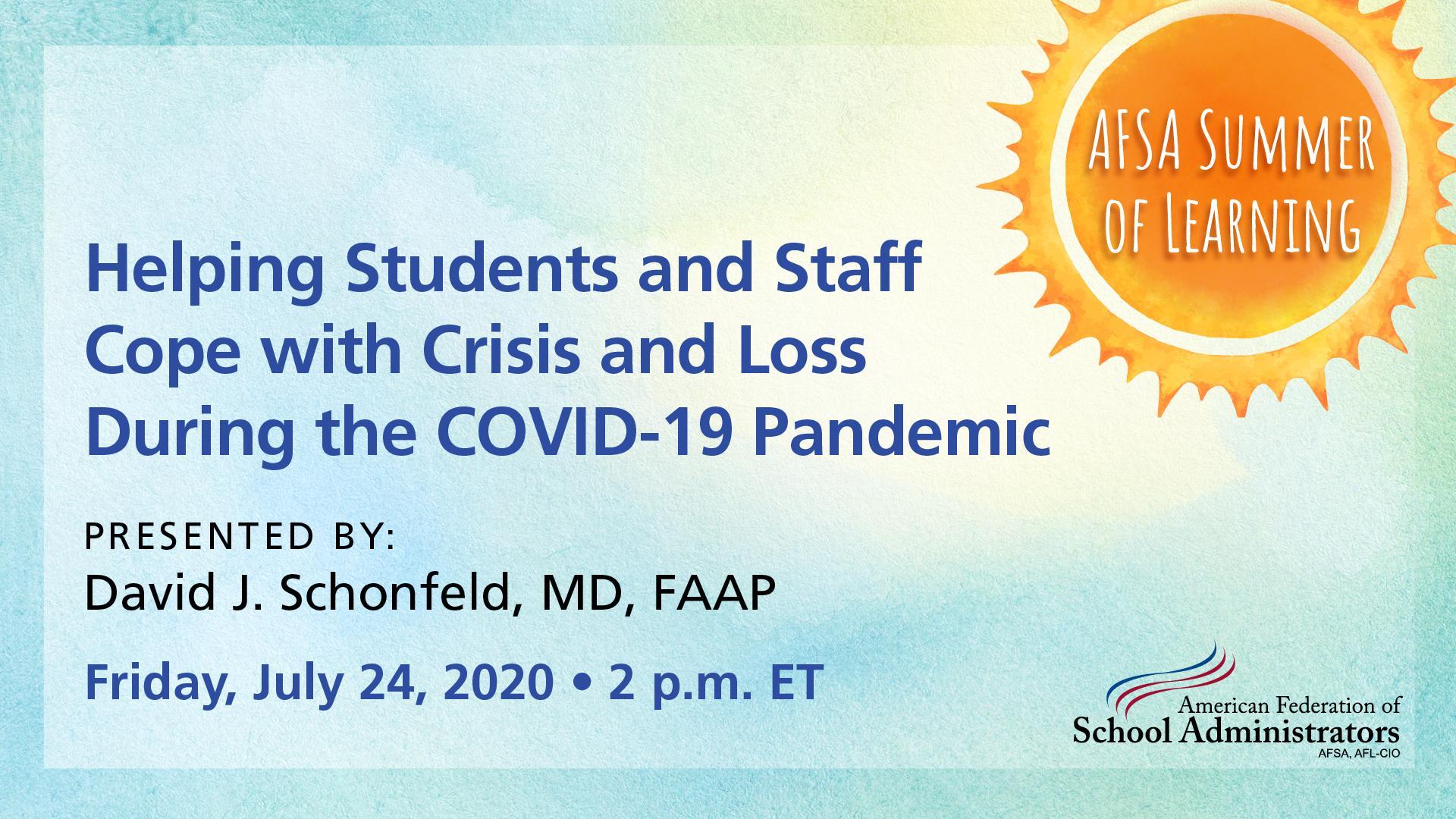School leaders have to be cognizant of the severe emotional toll this pandemic has taken on students, staff and ourselves. Our communities are facing pains that aren’t always physical, and we need the tools to help them.
AFSA concluded its “Summer of Learning” series with a session on providing mental health resources in the time of COVID, led by Dr. David Schonfeld, director of the National Center for School Crisis and Bereavement. Schonfeld offered a wide range of methods to help students and adults cope with extreme circumstances.
Supporting Students
Crises can have long-lasting impacts on the mental well-being of young people. In the months following the 9/11 attacks, one in 10 New York City students was diagnosed with psychological disorders, ranging from post traumatic stress disorder to major depressive disorder, to separation anxiety disorder. Some 15% of the students developed agoraphobia, the fear of traveling outside of the home. Given the severity of COVID-19, Schonfeld projects that the number of students with mental health disorders will increase drastically. Therefore, schools must be ready to aid students in any way they can.
“Anyone that interacts with children can be a potential source of assistance and support,” said Schonfeld, citing a story on how lunch service workers helped a school to address increasing mental health issues within its student body.
He went on to suggest these strategies for practicing open communications with students and supporting them as they navigate their feelings:
- Don’t pretend everything is OK: Children observe more than adults assume. Instead of hiding feelings of concern, be honest with students; this will encourage them to be honest with you.
- Use information constructively: There are harmful rumors about coronavirus swarming our media. Point students to the appropriate sources of information and remind them of the actions they can take to keep themselves and others safe. If you have younger children, let them decide which 20-second song they’ll sing when washing their hands.
- Provide healthy distractions: While being informed is paramount, constant information can be acutely distressing. Offer students creative outlets to express and entertain themselves such as crafting, writing and playing music. It may be worthwhile to introduce them to mindfulness, yoga and other relaxation techniques.
- Identify different forms of grief: During this pandemic, many students will face the death of a loved one and, even more, will experience secondary loss (knowing someone in mourning). This will increase students’ fears for their own lives and those around them. Also, not all forms of grief involve death; students have lost opportunities to share key life events. School communities need to be sensitive to all forms of loss and not devalue anyone’s feelings.
Schonfeld noted that some students may need assistance more than others, depending on their mental state or socioeconomic status.
“Issues of racial injustice may be additional stressors on students during this time,” Schonfeld added. “Discussion on the impact of the pandemic may remind children of other difficulties, such as events in the past, ongoing challenges or concerns about future loss.”
Supporting Staff
Students aren’t the only ones suffering during this time; educators are facing financial, emotional and other stresses. Many are parents, having to work from home while nurturing their children. Your faculty and staff will need as much relief as possible. Their schools should:
- Prepare ample organizational support: Schools need substitute teachers and additional support staff. Even though many will be doing virtual learning, educators will need days off to deal with personal matters. Schools also must be willing to modify workload, expectations and schedules. Circumstances for staff can and will change on a dime, and schools must be ready to roll with the punches. Finally, schools should consider holding consistent staffwide check-ins to gauge the mental wellness of educators and to provide words of encouragement.
- Provide family and peer support: Teachers and staff are in this together. It’s important to focus on both professional and personal relationships to get through this difficult time. Keep open channels for dialogues, letting staff know that you care.
Supporting Yourself
While it’s natural for school leaders to dedicate all their time and energy to serving their community, you have to serve your own needs, too. You shouldn’t feel guilty for using time and resources to process emotions. Schonfeld asks every administrator to remember the following challenges about leadership during a crisis:
- No matter what you do, you can’t control everything. Instead of worrying about things out of your control, focus on the tangible actions you can take to make the situation better.
- People will have different views on how to handle this crisis and feel strongly about those views. However, you can’t make everyone happy. While it’s important to listen to your community, safety must be your No. 1 concern.
- You can’t stop to focus on recovery. Leaders are finding solutions to this crisis in real time. Be ready to access every resource at your disposal to continue educating.
While these circumstances are extraordinary, so are our educators. Schonfeld remains optimistic that school leaders will continue giving exceptional support to their communities.
“I believe schools will rise to the occasion,” he said. “We provided help before the pandemic, and we will do so afterward.”

